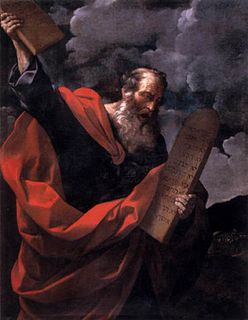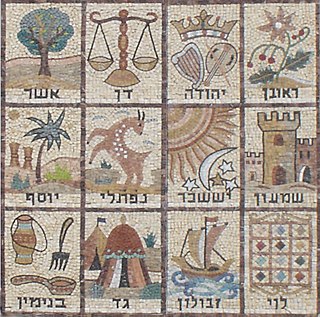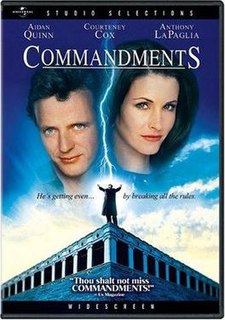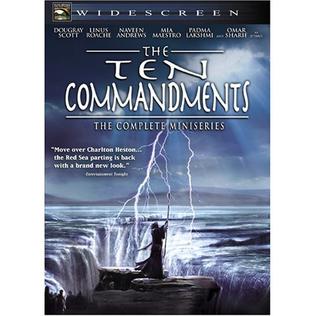
The Book of Exodus is the second book of the Bible. Starting with the deliverance of Moses by Pharaoh's daughter, it recounts the revelation at the Burning bush where he was called by Yahweh to deliver the Israelites from Egyptian slavery. After Pharaoh rejected his and Aaron's demands, according to the book, the Almighty inflicted ten Plagues on Egypt resulting in the Exodus. The Mosaic covenant was made at the biblical Mount Sinai, and subsequently the Tabernacle, with a "divine indwelling" of God with Israel.

Jeroboam I was the first king of the northern Kingdom of Israel. The Hebrew Bible describes the reign of Jeroboam to have commenced following a revolt of the ten northern Israelite tribes against Rehoboam that put an end to the United Monarchy.

Moses, also known as Moshe Rabbenu, is the most important prophet in Judaism, and an important prophet in Christianity, Islam, the Baháʼí Faith, and a number of other Abrahamic religions. In the biblical and quranic narrative, he was the leader of the Israelites and lawgiver to whom the authorship, or "acquisition from heaven", of the Torah is attributed.

The Israelites were a confederation of Iron Age Semitic-speaking tribes of the ancient Near East, who inhabited a part of Canaan during the tribal and monarchic periods.

The Ten Commandments is a 1956 American epic religious drama film produced, directed, and narrated by Cecil B. DeMille, shot in VistaVision, and released by Paramount Pictures. Based on the 1949 novel Prince of Egypt by Dorothy Clarke Wilson, the 1859 novel Pillar of Fire by J. H. Ingraham, the 1937 novel On Eagle's Wings by A. E. Southon, and the Book of Exodus, The Ten Commandments dramatizes the biblical story of the life of Moses, an adopted Egyptian prince who becomes the deliverer of his real brethren, the enslaved Hebrews, and thereafter leads the Exodus to Mount Sinai, where he receives, from God, the Ten Commandments. The film stars Charlton Heston in the lead role, Yul Brynner as Rameses, Anne Baxter as Nefretiri, Edward G. Robinson as Dathan, Yvonne De Carlo as Sephora, Debra Paget as Lilia, and John Derek as Joshua; and features Sir Cedric Hardwicke as Sethi, Nina Foch as Bithiah, Martha Scott as Yochabel, Judith Anderson as Memnet, and Vincent Price as Baka, among others.

The Plagues of Egypt, in the story of the book of Exodus, are ten disasters inflicted on Egypt by the God of Israel in order to convince the Pharaoh to allow the Israelites to depart from slavery, each of them confronting Pharaoh and one of his Egyptian gods; they serve as "signs and marvels" given by God to answer Pharaoh's taunt that he does not know Yahweh: "The Egyptians shall know that I am the LORD".

According to the Bible, the golden calf was an idol made by the Israelites when Moses went up to Mount Sinai. In Hebrew, the incident is known as ḥēṭ’ ha‘ēggel or the Sin of the Calf. It is first mentioned in Exodus 32:4.

Commandments is a 1997 American romantic comedy-drama which was written and directed by Daniel Taplitz and stars Aidan Quinn, Courteney Cox and Anthony LaPaglia. The executive producer was Ivan Reitman.

According to the Hebrew Bible, the Tablets of the Law as they are widely known in English, or Tablets of Stone, Stone Tablets, or Tablets of Testimony in the Exodus 34:1, were the two pieces of stone inscribed with the Ten Commandments when Moses ascended biblical Mount Sinai as written in the Book of Exodus.

The Ten Commandments, also known as the Decalogue, are a set of biblical principles relating to ethics and worship that play a fundamental role in Judaism and Christianity. The text of the Ten Commandments appears twice in the Hebrew Bible: at Exodus 20:2–17 and Deuteronomy 5:6–21.

The Ten Commandments is a 1923 American silent religious epic film produced and directed by Cecil B. DeMille. Written by Jeanie MacPherson, the film is divided into two parts: a prologue recreating the biblical story of the Exodus and a modern story concerning two brothers and their respective views of the Ten Commandments.

The Pharaoh's daughter in the story of the finding of Moses in the biblical Book of Exodus is an important, albeit minor, figure in Abrahamic religions. Though some variations of her story exist, the general consensus among Jews, Christians, and Muslims is that she is the adoptive mother of the prophet Moses. Muslims identify her with Asiya, the Great Royal Wife of the pharaoh. In either version, she saved Moses from certain death from both the Nile river and from the Pharaoh. As she ensured the well-being of Moses throughout his early life, she played an essential role in lifting the Hebrew slaves out of bondage in Egypt, their journey to the Promised Land, and the establishment of the Ten Commandments.

The Ten Commandments is a 2006 miniseries that dramatizes the biblical story of Moses. It ran on the ABC TV network.

Desire Under the Elms is a 1958 American film version of the 1924 play Desire Under the Elms written by Eugene O'Neill. The film was directed by Delbert Mann from a screenplay by O'Neill and Irwin Shaw. The cast included Sophia Loren as Abbie, Anthony Perkins as Eben, Burl Ives as Ephraim, Frank Overton as Simeon, and Pernell Roberts as Peter. The film was nominated for Best Black and White Cinematography at the Academy Awards and Laurel Awards in 1959. It was also entered into the 1958 Cannes Film Festival.

Allusions in rabbinic literature to the biblical character Moses, who led the people of Israel out of Egypt and through their wanderings in the wilderness, contain various expansions, elaborations and inferences beyond what is presented in the text of the Bible itself.

The Quran, the central religious text of Islam, contains references to more than fifty people and events also found in the Bible. While the stories told in each book are generally comparable, there are also some notable differences. Knowing that versions written in the Hebrew Bible and the Christian New Testament predate the Qur'ān's versions, Christians reason the Qurān's versions as being derived directly or indirectly from the earlier materials. Muslims understand the Qur'ān's versions to be knowledge from an omnipotent God. As such, Muslims generally believe that the earlier versions are distorted through flawed processes of transmission and interpretation over time, and consider the Qur'ān's version to be more accurate.

For the French musical of 2000, see Les Dix Commandements (musical)The Ten Commandments: The Musical is a musical with music by Patrick Leonard and lyrics by Maribeth Derry. The book is adapted from the French musical Les Dix Commandements created by Élie Chouraqui from an idea by Albert Cohen.
The firstborn or firstborn son is an important concept in Judaism. The role of firstborn son carries significance in the redemption of the first-born son, in the allocation of a double portion of the inheritance, and in the prophetic application of "firstborn" to the nation of Israel.

The Tables of the Law is a 1944 novella by German writer Thomas Mann. It is a dramatic retelling of the Biblical story of Moses contained in the Book of Exodus, although some of the laws which Moses proscribes for his followers are taken from Leviticus. It was the only story that Mann was ever commissioned to write, and he finished it in just eight weeks, beginning on January 18, 1943, and ending on March 13, 1943. Publisher Armin L. Robinson, believing the Ten Commandments to be the basis on which civilization was founded, wanted to make a movie detailing the Nazis' "desecration of the Mosaic Decalogue." Instead, he settled on a book, entitled The Ten Commandments: Ten Short Novels of Hitler's War Against the Moral Code, with ten authors, one for each commandment. Mann's novella, which he was paid $1000 to write, was originally meant to be the introduction to the volume, but Robinson liked it so much that he decided to make it the first story, under the heading "Thou Shalt Have No Other God Before Me." Mann considered his story to be greatly superior to that of his fellow contributors, and he considered the overall book a "failure".